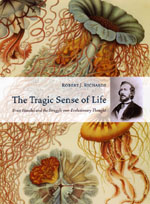Happy Birthday, Ernst Haeckel
 As the cacophonous celebrations of Darwin’s bicentenary wind down, another important, though less well known, evolutionary theorist celebrates a milestone birthday. Today marks the 175th anniversary of the birth of Ernst Haeckel (1834—1919), the eminent German biologist, naturalist, philosopher, and artist. A great champion of Darwin, Haeckel helped popularize the theory of evolution in Germany; indeed, prior to the First World War, more people learned of evolution from Haeckel’s voluminous writings than through any other source, including the writings of Darwin himself. In addition, Haeckel gave currency to the idea of the “missing link” between apes and man, formulated the concept of ecology, and promulgated the “biogenetic law”—the idea that the embryo of an advanced species recapitulates the stages the species went through in its evolutionary descent. But, with detractors ranging from paleontologist Stephen Jay Gould to modern-day creationists and advocates of Intelligent Design, Haeckel is better known as a divisive figure than as a pioneering biologist and today, Haeckel remains obscured by the shadow of the man whose theories he worked so tirelessly to promote.
As the cacophonous celebrations of Darwin’s bicentenary wind down, another important, though less well known, evolutionary theorist celebrates a milestone birthday. Today marks the 175th anniversary of the birth of Ernst Haeckel (1834—1919), the eminent German biologist, naturalist, philosopher, and artist. A great champion of Darwin, Haeckel helped popularize the theory of evolution in Germany; indeed, prior to the First World War, more people learned of evolution from Haeckel’s voluminous writings than through any other source, including the writings of Darwin himself. In addition, Haeckel gave currency to the idea of the “missing link” between apes and man, formulated the concept of ecology, and promulgated the “biogenetic law”—the idea that the embryo of an advanced species recapitulates the stages the species went through in its evolutionary descent. But, with detractors ranging from paleontologist Stephen Jay Gould to modern-day creationists and advocates of Intelligent Design, Haeckel is better known as a divisive figure than as a pioneering biologist and today, Haeckel remains obscured by the shadow of the man whose theories he worked so tirelessly to promote.
Last June, University of Chicago historian of science Robert J. Richards delivered an early birthday present for Haeckel, The Tragic Sense of Life: Ernst Haeckel and the Struggle over Evolutionary Thought . An intellectual biography that rehabilitates Haeckel and provides the most accurate measure of his science and art yet written, it is the definitive account of Darwin’s greatest intellectual heir. Praised by the Times Literary Supplement as “a fitting testament to a complex and contradictory character”, The Tragic Sense of Life examines the intellectual context as well as the intimate experiences and profound convictions that allowed Darwin’s message to become almost a religious calling for Haeckel. Far from shying away from the many controversies that marked Haeckel’s life and career, Richards engages Haeckel’s many challengers and dissenters, whose accusations against him range from the charge that he falsified some of his famous drawings to the supposedly proto-Nazi quality of his biological theories. Reappraising Haeckel’s accomplishments, artistic endeavors, many battles, personal relationships, and searing loves, Richards convincingly demonstrates the enormous impact Haeckel had on biology and larger scientific affairs during the last half of the nineteenth and early part of the twentieth centuries.
Happy birthday, Ernst Haeckel.